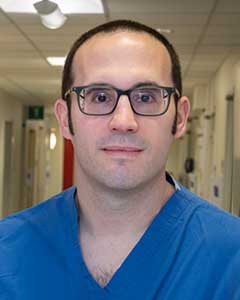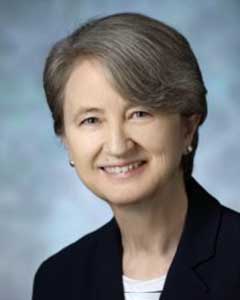At the forefront of patient care, research and education on the world’s deadliest diseases.
The Johns Hopkins Special Pathogens Center is dedicated to preparing for, monitoring and treating highly lethal infections and diseases of unknown origin. Our center brings together the expertise of three distinct areas at Johns Hopkins Medicine — clinical care, research and education — to respond to special pathogens.
Areas of Expertise
Clinical Care
Research Spotlight: The role of dedicated biocontainment patient care units in preparing for COVID-19 and other infectious disease outbreaks

Research
Research Spotlight: Racial and Ethnic Discrepancy in Pulse Oximetry and Delayed Identification of Treatment Eligibility Among Patients With COVID-19

Education
For more information on STEP, contact Chris Sulmonte, administrative director, at csulmon1@jh.edu.
Research Spotlight: Creating a Safety Officer Program to Enhance Staff Safety During the Care of COVID-19 Patients

How a Biocontainment Unit Helped Lead the Response to COVID-19
Watch an interview with Brian Garibaldi, M.D., director of the Special Pathogens Center. As part of a video series about Johns Hopkins Medicine’s response to the COVID-19 pandemic, Garibaldi describes how the Johns Hopkins Biocontainment Unit played an important role in the health system’s multidisciplinary planning and response.
Select Peer-Reviewed Publications
The role of dedicated biocontainment patient care units in preparing for COVID-19 and other infectious disease outbreaks
This article describes how the foundation of special pathogen readiness was leveraged to strengthen the national health care system’s response to the COVID-19 pandemic.
Racial and Ethnic Discrepancy in Pulse Oximetry and Delayed Identification of Treatment Eligibility Among Patients With COVID-19
This article describes how pulse oximeters underestimate hypoxemia more frequently in underrepresented minorities, which can lead to delays in recognizing individuals who are eligible for COVID-19-specific treatments.
Development of Severe COVID-19 Adaptive Risk Predictor (SCARP), a Calculator to Predict Severe Disease or Death in Hospitalized Patients With COVID-19
This article describes the creation of a clinical prediction model that accurately identifies hospitalized patients with COVID-19 who are at risk of progression to severe disease or death.
Creating a Safety Officer Program to Enhance Staff Safety During the Care of COVID-19 Patients
This article describes the development of a safety and transport safety officer program aimed to maintain health care worker safety by bolstering PPE trainers during the COVID-19 pandemic response.
The Use of Temperature and Pressure Data Loggers to Validate the Steam Sterilization of Category A Clinical Waste
This article describes the methods used by the Johns Hopkins BCU to verify autoclave settings to inactivate clinical care waste.
The Risk of Not Being Ready: a Novel Approach to Managing Constant Readiness of a High-Level Isolation Unit During Times of Inactivity
This article describes the development of the Johns Hopkins BCU’s readiness evaluation tool, which is focused on critical infrastructure, staffing and supply elements required for rapid unit activation.
Additional Resources
-
Johns Hopkins Medicine Division of Infectious Diseases
The Division of Infectious Diseases at Johns Hopkins is nationally and internationally known for its excellence in the study and treatment of infections. With over 400 people in the division, its primary goal is to combat infectious diseases worldwide.
-
Johns Hopkins Pulmonary and Critical Care Medicine
The Division of Pulmonary and Critical Care Medicine strives to improve the health of our own patients and those we may never meet, by teaching and advancing the state of medical knowledge. The division has over 70 full-time faculty and part-time clinical faculty with expertise in diseases including asthma, COPD, critical care, cystic fibrosis, interstitial lung disease, lung cancer, lung transplantation, neuromuscular disease, pulmonary hypertension, sarcoidosis and sleep medicine.
Team
Brian T. Garibaldi, M.D., M.E.H.P.

Christopher Sulmonte, M.H.A.

Jade Flinn, M.S.N., R.N.

Carrie Billman, R.N., C.I.C.

Noreen Hynes, M.D., M.P.H., D.T.M.&H.

Mark Romig, M.D.

Chad Bowman, M.S.N., R.N., C.F.R.N., N.R.P.


